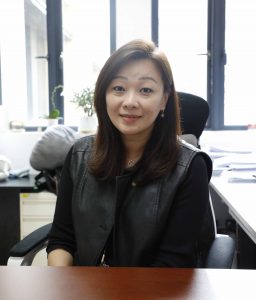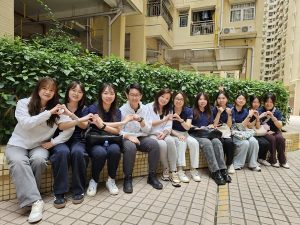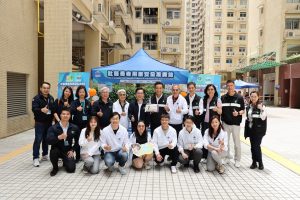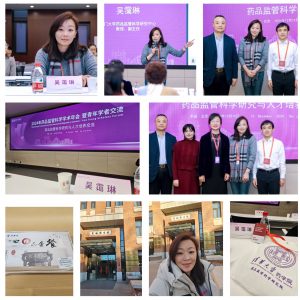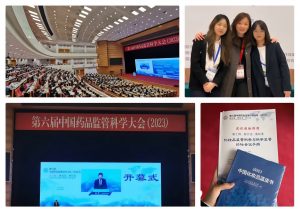Born and raised in Macao, Carolina Ung Oi Lam is an assistant professor in the Institute of Chinese Medical Sciences (ICMS) and the Department of Public Health and Medicinal Administration in the Faculty of Health Sciences (FHS) at the University of Macau (UM). This pharmaceutical expert also serves as deputy director of UM’s Centre for Pharmaceutical Regulatory Sciences. After completing her studies in Australia, Prof Ung returned to Macao and worked in the government’s drug regulatory department. However, driven by a strong desire to contribute her pharmaceutical expertise to her home city, she later made a bold career shift into teaching and research. Today, Prof Ung is focused on strengthening Macao’s public health infrastructure and pharmaceutical regulatory systems through evidence-based science. At the same time, she is committed to training the next generation of medicinal administration professionals. Prof Ung believes that the opportunities for pharmaceutical professionals are limitless and their work is always grounded in meeting Macao’s needs.
Staying true to her childhood aspiration
In early May, Prof Ung led a group of master’s students in medicinal administration to conduct an outreach activity in the Seac Pai Van community in Coloane, where they taught senior residents how to use weekly pill organisers. Throughout the activity, Prof Ung occasionally stepped in to show students how to create medication labels for the elderly and answered questions from elderly people with chronic illnesses about taking multiple medicines.
The outreach activity is part of a community health initiative organised by the Pharmaceutical Administration Bureau and the Health Bureau of the Macao SAR government. It aims to promote medication safety among local seniors. As a faculty member in the medicinal administration programme, Prof Ung often encourages her students to participate in similar activities. She sees this as a ‘classroom in motion’, where students can discover the social value of pharmacy through community service and senior residents can benefit from professional pharmacy services. This initiative has significantly raised awareness of medication safety in the community, creating far-reaching benefits.
Prof Ung’s vision of community service began in her childhood. Inspired by her mother, who is a nurse, Ung developed an early interest in the medical field and a deep appreciation for healthcare professionals. ‘At that time, there were very few professional pharmacists in Macao’s healthcare system and local medical institutions lacked professional medication instruction,’ she recalls. Consequently, many of her classmates opted to study medicine or nursing at university. After graduating from a Macao secondary school in 1996, Ung also chose to study pharmacy in Australia. Her goal was clear: to use her pharmacy knowledge to provide patients in her home city with appropriate medication and guidance.
Undergoing two career shifts
To achieve her goals, Ung dedicated herself to studying pharmacy. After graduating with a Bachelor of Pharmacy from the University of Sydney, she gained valuable clinical experience working as a registered pharmacist in Australia. Her commitment to professional excellence then led her to pursue a master’s degree in health science. After almost a decade of academic training and professional development in Australia, she returned to Macao in 2005. However, she realised that the role of pharmacists in Macao was very different from Australia. ‘In Australia, pharmacists play a key role in patient care, developing and optimising medication plans. But back then, pharmacists in Macao often worked in pharmacies that operated more like retail stores. Clinical pharmacy practice did not exist in Macao,’ she explains.
This experience made Ung reconsider her role and set her on an entirely new professional trajectory. Staying true to her aspirations in pharmacy, she moved into drug regulation, where she could combine scientific rigour with population health impact. In 2006, she joined the Pharmaceutical Affairs Department of Macao’s Health Bureau, shifting her focus from providing individual patient care to developing public health systems.
Ung describes this career transition as challenging. Her new workplace, the Pharmaceutical Affairs Department, is responsible for developing and optimising Macao’s drug regulatory framework. This required her to shift from hands-on clinical practice to unfamiliar regulatory and administrative work. This experience provided Ung with profound insight into the importance of drug regulatory systems, as well as the core principles of regulatory science and the scientific basis behind the regulations. Later, to gain a more systematic understanding of theory and knowledge relating to pharmaceutical supply chain management and decision-making processes, she decided to pursue a PhD in biomedical sciences at UM.
After earning her PhD from UM in 2017, Prof Ung made a second career shift into academia. She left her stable government job to become a UM Macao Fellow, transforming from an executor of drug regulatory systems into a researcher. She believes that nurturing local talent through academic research can contribute to the development of Macao’s drug regulatory systems.
Serving Macao through scientific research
In 2019, Prof Ung entered her third year at UM. While her teaching and research were getting on track, the COVID-19 pandemic broke out, imposing a significant impact on her academic career. As a scholar in medicinal administration who advocates for evidence-based policymaking, Prof Ung conducted a series of studies to support the implementation and optimisation of the Macao SAR government’s epidemic prevention and control measures.
During the pandemic, an ICMS research team on which Prof Ung was a member conducted a survey of Macao residents to assess their willingness to receive the COVID-19 vaccines and the factors influencing their opinions. The results showed that, while some respondents were hesitant about the vaccines, most felt it was their social responsibility to be vaccinated. Based on these findings, the research team made recommendations to the government regarding epidemic prevention and control measures, coupled with vigorous public education campaigns about vaccine science.
As the epidemic situation gradually stabilised, Prof Ung conducted post-pandemic studies to systematically evaluate the effectiveness of various epidemic prevention and control measures, and thus provide scientific evidence for optimising public health crisis response systems. In 2022, Prof Ung collaborated with members of the UM Faculty of Business Administration (FBA) in interdisciplinary research analysing the synergy between public health and tourism management. They proposed a collaborative model involving community pharmacies and the tourism industry, suggesting that community pharmacies should be trained to serve as public information centres during the pandemic, rather than mere retail medicine shops. The two studies have been published in the international journals Research in Social and Administrative Pharmacy and Tourism and Hospitality.
Prof Ung’s team later collaborated with Macao hospitals to evaluate the effectiveness of the COVID-19 vaccine among elderly inpatients. The study found that full vaccination significantly reduced the risk of severe illness and death. Published in the journal Vaccines in 2024, the research provided empirical evidence in support of the continued implementation of Macao’s vaccination programme for senior residents. ‘The pandemic has taught us that crisis management should not be the end goal of public health research. Instead, we must focus on using our hard-earned experiences to make sustained improvements to the entire public health system,’ Prof Ung emphasises.
Advancing pharmaceutical regulatory science
Alongside her work in community health and chronic disease research, Prof Ung has championed the advancement of pharmaceutical regulatory science as a core academic pursuit. Combining her Macao expertise with a global perspective, she is committed to aligning Macao’s drug regulatory framework with international standards. In late April, Prof Ung was delivering an academic presentation at the Faculty of Pharmacy of the University of Lisbon when Portugal experienced an unprecedented and widespread power outage. Undeterred by the blackout, she continued her presentation using only natural light, providing an overview of the development of Macao’s drug regulatory system and presenting research breakthroughs by UM’s Centre for Pharmaceutical Regulatory Sciences.
This academic exchange was part of a bilateral partnership under the European Union’s Erasmus+ programme, which involves mandatory faculty exchanges between partner institutions. In March, a group of researchers from the University of Lisbon visited UM and toured pharmaceutical establishments in the Guangdong-Hong Kong-Macao Greater Bay Area. UM’s regulatory science research team is currently cooperating with academic institutions in Portugal and Cape Verde, and is extending its network to Brazil, gradually developing a model of collaborative research with Portuguese-speaking countries.
Why international partnerships? Prof Ung advocates for the concept of ‘regulatory convergence’, whereby, different countries or regions create similar drug-related rules and regulations, while ensuring the quality, safety and efficacy of medicines, and preserving local medical practices. By enhancing regulatory capacity, fostering technical cooperation, and promoting the sharing of resources, the barriers to the flow of medicines across borders can be lowered, thereby benefiting patients worldwide. Prof Ung believes that realising this approach relies on regulatory science, an emerging discipline that aims to integrate cutting-edge knowledge in drug research and development, pharmacology, toxicology, and epidemiology. The discipline’s core purpose is to develop innovative assessment tools, standards, and methodologies that support drug regulatory decision-making, and promote the precision and internationalisation of drug regulation.
Since 2019, Prof Ung’s research team has been engaged in pharmaceutical regulatory science research, and has published around 20 articles in international journals. In 2023, the results of a two-year study were published in the International Journal of Health Policy and Management. For this study, the team reviewed 43 studies and six documents about regulatory benchmarking published between 2005 and 2022. They identified five benchmarking assessment tools or programmes adopted by international organisations and government agencies worldwide, and developed an integrated benchmarking framework comprising a total of 382 sub-indicators. This integrative review provides drug regulators with a framework for strategic planning and monitoring, thereby enhancing their regulatory capacity.
In a paper published in the China Food & Drug Administration Magazine in early May, Prof Ung and her research team examined how fragmented regulatory standards across the Asia-Pacific region—the fastest-growing market in the global pharmaceutical sector—cause significant delays in the approval of new medicines. They proposed an innovative solution that uses benchmarking to strengthen regulatory capacity and establish mutual recognition of approvals, a concept known as ‘regulatory reliance’. This approach promises to significantly streamline international drug approval processes, accelerating access to integrated healthcare products around the world, including traditional Chinese medicines and novel drugs.
The stage for pharmaceutical specialists
Prof Ung’s aspiration to contribute to society through her professional knowledge was forged in her childhood, and has guided her through several crossroads in life. After returning from Australia, she combined her international perspective with a commitment to serving Macao. To further her efforts to advance public health in Macao, Prof Ung has pursued new professional paths to explore the science behind drug regulation. Prof Ung believes pharmacy not only involves conducting research in the laboratory; it serves as a bridge between science and everyday life. ‘The prospects for pharmacists are limitless,’ adds Prof Ung.
As graduation season approaches, Prof Ung looks at the bright-eyed graduates, and sees her younger self in them. ‘I once believed pharmacy graduates could only become pharmacists in retail pharmacies. Now, the healthcare industry has offered far greater possibilities.’ To pharmacy graduates who now enjoy more diverse career development opportunities in Macao, Hong Kong and mainland China, Prof Ung has a piece of advice: ‘Stay open-minded, address societal needs with your professional expertise, and you will find your spot in the medical field.’
About Prof Carolina Ung
Carolina Ung Oi Lam is an assistant professor in the Institute of Chinese Medical Sciences (ICMS) and the Department of Public Health and Medicinal Administration of the Faculty of Health Sciences (FHS), as well as the deputy director of the Centre for Pharmaceutical Regulatory Sciences at the University of Macau (UM). She completed a Bachelor of Pharmacy and a Master of Health Science (Health Informatics) at the University of Sydney, and obtained her PhD in Biomedical Sciences at UM. She is also a registered pharmacist in Australia and Macao.
Prof Ung’s research mainly falls within the following four areas: 1) regulatory science in medical and pharmaceutical products, 2) evidence base about traditional, complementary and integrative medicine, 3) community health and chronic disease management, and 4) social and administrative pharmacy. To date, she has published over 130 research papers. Prof Ung also holds editorial positions for multiple peer-reviewed international SCI/SSCI journals. She has been recognised as a ‘Top Reviewer’ by Research in Social and Administrative Pharmacy for two consecutive years (2023 and 2024), and has received the Emerging Scholar Award from ICMS in the 2021/2022 academic year, as well as the Best Teacher Award from FHS in the 2023/2024 academic year.
